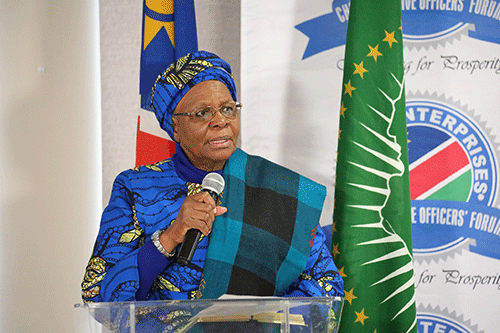Rudolf Gaiseb
Vice President Netumbo Nandi-Ndaitwah said bureaucracy in State-owned enterprises (SOEs) delays Namibia’s progress.
She recommended that these businesses adopt new approaches to speed up economic transformation.
“The purpose of SOEs was to get rid of bureaucracy to speed up the economic transformation of our country from a colonial economy to an economy that will save the Namibian people,” she said while addressing the Public Enterprises’ CEO Forum, hosted in Windhoek last week.
She urged public enterprises to work according to their missions and mandates.
During the engagement, leaders of various public enterprises discussed the roles their organisations play in accelerating socio-economic development in Namibia as well as approaches to implementing winning strategies to ensure food security in Namibia.
Although various members suggested the introduction of new technology in the facets of transportation and food production, Nandi-Ndaitwah said: “I believe in technology, but if we spend money on technology, the country may experience a social deficit. For example, we have people who walk around spraying malaria.
But if we start using drones to spray malaria in the villages and towns, these people will be out of jobs.
Using technologies such as drones in this aspect in a country trying to create jobs will make our people unemployed, and that is going to be a serious social deficit.
Therefore, when we introduce technology, we must ensure that it does not cause misery to our people, but rather takes them out of the situation in which they find themselves.
“This is what I want for parastatals. As you reform to support the economy, don’t just spend much money on technology in your institutions that you don’t use”.
According to the Ministry of Labour, Industrial Relations and Employment-Creation, over 12 000 job seekers were registered on the Namibia Integrated Employment Information System during the 2023/24 financial year.
Out of this number, only 1 350 job-seekers were placed in various industries.
“Our training institutions must talk to the markets. Otherwise, if we don’t do that, we will train for the streets. You can have your data, your statistics, about how many people have gone through your institution, but the question is, how many people are employed? Therefore, collaboration and coordination are important,” Nandi-Ndaitwah stated.
She asserted that although the private sector is profit-driven, the public sector is tasked with taking care of the immediate welfare of the people.
If the people’s welfare is not taken care of, the private sector is equally in danger.
“Service delivery should be the key for everybody, and accountability should be something we must all respect,” she said.
Public Enterprises CEOs Forum chairperson Fluksman Samuehl said “We went through the phase where the SOE sector was known as a liability to the Fiscus, and existed only for bailouts and, therefore, represented a significant burden on government budgets. There is a silver lining in the cloud.
We have observed infightings or tugs of war between some boards and CEOs, culminating in endless suspensions of CEOs. When that happens, the leadership vacuum kicks in, the morale of employees suffers for an extended period, and the image of the entity is badly tarnished. However, the picture of governance and overall performance is changing for the better”.
Namibia recently underwent a Universal Safety Oversight Audit Programme and Continuous Monitoring Approach, and showed an improvement in effective implementation across all audit areas from 57.39% in 2016 to 72.31% in 2024.
“This impressive performance confirms that the leadership is doing the right thing both at the Namibia Civil Aviation Authority and Namibia Airports Company.
The current performance exceeds the average of Eastern and Southern Africa, which stands at 60%, as well as the global average, which stands at 69.3%.
This boosts Namibia’s tourism industry, a major driver of the economy, contributing some 6.9% (N$14 billion) to Namibia’s GDP.
Equally, the Namibia Fish Consumption Promotion Trust has established 18 fish shops across the country, with the latest upgrade of the Ondangwa Fish Shop in the Oshana region with an investment of N$8 million to give customers the best shopping experience,” Samuehl remarked.
He also highlighted that the emerging oil and gas industry presents an opportunity for sustainable economic growth, and the overall development of Namibia if the resources are managed responsibly to the full benefit of the citizens.
“All public enterprises have their own separate mandates to fulfil, and ensure effective service delivery that positively impacts the Namibian society.
We are six years away from 2030, a crucial year earmarked by our government’s collective leadership to ensure our country is industrialised. We call upon our government to adopt alternative development strategies integrating the State-owned enterprise sector as vital stakeholders to help accelerate development, impacting all citizens both in urban and rural areas across the country,” he said.


